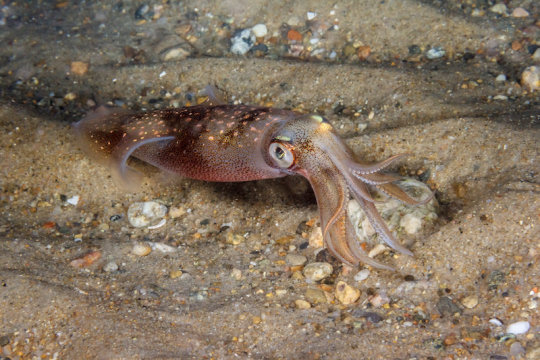New genetic editing powers discovered in squid
The study, led by Isabel C. Vallecillo-Viejo and Joshua Rosenthal at the Marine Biological Laboratory (MBL), Woods Hole, is published this week in Nucleic Acids Research.

The discovery provides another jolt to the "central dogma" of molecular biology, which states that genetic information is passed faithfully from DNA to messenger RNA to the synthesis of proteins. In 2015, Rosenthal and colleagues discovered that squid "edit" their messenger RNA instructions to an extraordinary degree -- orders of magnitude more than humans do -- allowing them to fine-tune the type of proteins that will be produced in the nervous system.
"But we thought all the RNA editing happened in in the nucleus, and then the modified messenger RNAs are exported out to the cell," says Rosenthal, senior author on the present study. "Now we are showing that squid can modify the RNAs out in the periphery of the cell. That means, theoretically, they can modify protein function to meet the localized demands of the cell. That gives them a lot of latitude to tailor the genetic information, as needed." The team also showed that messenger RNAs are edited in the nerve cell's axon at much higher rates than in the nucleus.
In humans, axon dysfunction is associated with many neurological disorders. Insights from the present study could accelerate the efforts of biotech companies that seek to harness this natural RNA editing process in humans for therapeutic benefit.
Scientists from Tel Aviv University and The University of California at Denver collaborated with MBL scientists on the study.
Previously, Rosenthal and colleagues showed that octopus and cuttlefish also rely heavily on mRNA editing to diversify the proteins they can produce in the nervous system. Together with squid, these animals are known for strikingly sophisticated behaviors, relative to other invertebrates.
Story Source:
Materials provided by Marine Biological Laboratory. Original written by Diana Kenney. Note: Content may be edited for style and length.
Journal Reference:
Joshua J C Rosenthal, Eli Eisenberg, Simon R Levinson, Kavita J Rangan, Sonya E Nemes, Maria F Montiel-Gonzalez, Juan F Diaz Quiroz, Noa Liscovitch-Brauer, Isabel C Vallecillo-Viejo. Spatially regulated editing of genetic information within a neuron. Nucleic Acids Research, 2020; DOI: 10.1093/nar/gkaa172
Ubigene Biosciences is co-founded by biological academics and elites from China, the United States, and France. We are located in Guangzhou Science City, which serves as a global center for high technology and innovation. Ubigene Biosciences has 1000㎡ office areas and laboratories, involving genome editing, cell biology technology, and zebrafish research. We provide products and services for plasmids, viruses, cells, and zebrafish. We aim to provide customers with better gene-editing tools for cell or animal research.
We developed CRISPR-U™ and CRISPR-B™ (based on CRISPR/Cas9 technology) which is more efficient than general CRISPR/Cas9 in double-strand breaking, CRISPR-U™ and CRISPR-B™ can greatly improve the efficiency of homologous recombination, easily achieve knockout (KO), point mutation (PM) and knockin (KI) in vitro and in vivo.
Genome Editing Platform
——Focusing on the Application of CRISPR-U™ and CRISPR-B™ Gene Editing Technology
1. Provides various types of gene-editing vectors for different species.2. Provides different virus packaging services, including lentiviruses, adenoviruses and adeno-associated viruses.3. Provides high-quality services for gene knockout, point mutation and knockin cell lines.
Cell Biology Platform
——Focusing on primary cell
1. Provides over 400 types of primary cells.2. Provides culture strategies and related products for different cell types.3. Provides cell biology-related services such as cell isolation, extraction and validation.

